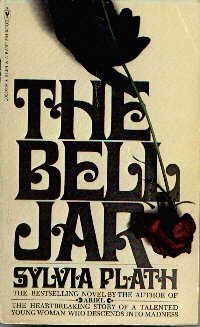FRtR > Outlines > American Literature > American Poetry Since 1945 > Authors > Sylvia Plath (1932-1963)
An Outline of American Literature
by Kathryn VanSpanckeren
American Poetry Since 1945: Authors: Sylvia Plath (1932-1963)
*** Index***
 Sylvia Plath lived an outwardly exemplary life, attending
Smith College on scholarship, graduating first in her class, and
winning a Fulbright grant to Cambridge University in England.
There she met her charismatic husband-to-be, poet Ted Hughes,
with whom she had two children and settled in a country house in
England. Beneath the fairy-tale success festered unresolved
psychological problems evoked in her highly readable novel The
Bell Jar (1963). Some of these problems were personal, while
others arose from repressive 1950s attitudes toward women. Among
these were the beliefs -- shared by most women themselves -- that
women should not show anger or ambitiously pursue a career, and
instead find fulfillment in tending their husbands and children.
Successful women like Plath lived a contradiction.
Sylvia Plath lived an outwardly exemplary life, attending
Smith College on scholarship, graduating first in her class, and
winning a Fulbright grant to Cambridge University in England.
There she met her charismatic husband-to-be, poet Ted Hughes,
with whom she had two children and settled in a country house in
England. Beneath the fairy-tale success festered unresolved
psychological problems evoked in her highly readable novel The
Bell Jar (1963). Some of these problems were personal, while
others arose from repressive 1950s attitudes toward women. Among
these were the beliefs -- shared by most women themselves -- that
women should not show anger or ambitiously pursue a career, and
instead find fulfillment in tending their husbands and children.
Successful women like Plath lived a contradiction.
Plath's storybook life crumbled when she and Hughes
separated and she cared for the young children in a London
apartment during a winter of extreme cold. Ill, isolated, and in
despair, Plath worked against the clock to produce a series of
stunning poems before she committed suicide by gassing herself in
her kitchen. These poems were collected in the volume
Ariel
(1965), two years after her death. Robert Lowell, who wrote the
introduction, noted her poetry's rapid development from the time
she and Anne Sexton had attended his poetry classes in 1958.
Plath's early poetry is well-crafted and traditional, but her
late poems exhibit a desperate bravura and proto-feminist cry of
anguish. In "The Applicant" (1966), Plath exposes the emptiness
in the current role of wife (who is reduced to an inanimate
"it"):
A living doll, everywhere you look.
It can sew, it can cook.
It can talk, talk, talk.
It works, there is nothing wrong with it.
You have a hole, it's a poultice.
You have an eye, it's an image.
My boy, it's your last resort.
Will you marry it, marry it, marry it.
Plath dares to use a nursery rhyme language, a brutal
directness. She has a knack for using bold images from popular
culture. Of a baby she writes, "Love set you going like a fat
gold watch." In "Daddy," she imagines her father as the Dracula
of cinema: "There's a stake in your fat black heart / And the
villagers never liked you."
*** Index***
 Sylvia Plath lived an outwardly exemplary life, attending
Smith College on scholarship, graduating first in her class, and
winning a Fulbright grant to Cambridge University in England.
There she met her charismatic husband-to-be, poet Ted Hughes,
with whom she had two children and settled in a country house in
England. Beneath the fairy-tale success festered unresolved
psychological problems evoked in her highly readable novel The
Bell Jar (1963). Some of these problems were personal, while
others arose from repressive 1950s attitudes toward women. Among
these were the beliefs -- shared by most women themselves -- that
women should not show anger or ambitiously pursue a career, and
instead find fulfillment in tending their husbands and children.
Successful women like Plath lived a contradiction.
Sylvia Plath lived an outwardly exemplary life, attending
Smith College on scholarship, graduating first in her class, and
winning a Fulbright grant to Cambridge University in England.
There she met her charismatic husband-to-be, poet Ted Hughes,
with whom she had two children and settled in a country house in
England. Beneath the fairy-tale success festered unresolved
psychological problems evoked in her highly readable novel The
Bell Jar (1963). Some of these problems were personal, while
others arose from repressive 1950s attitudes toward women. Among
these were the beliefs -- shared by most women themselves -- that
women should not show anger or ambitiously pursue a career, and
instead find fulfillment in tending their husbands and children.
Successful women like Plath lived a contradiction.